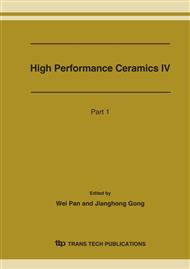p.1612
p.1615
p.1618
p.1622
p.1625
p.1628
p.1632
p.1635
p.1638
In Vivo Behavior of Injectable Fast-Setting Calcium Phosphate Cement
Abstract:
The in vivo study was performed to evaluate the biocompatibility and osteogenous ability of injectable fast-setting calcium phosphate cement (CPC). Eighteen four-week-old New Zealand white rabbits were divided into six groups randomly, three in each group. According to the principle of selfcontrast at the same time, cavities of 5mm in diameter and 6mm in depth were drilled in femoral condyle of rabbits. The materials were implanted into cavities of the left leg, the right leg as the blank control group. Rabbits were sacrificed at 2, 4, 8, 12, 16 and 24 weeks after surgery. The microstructure of specimens was observed using ESEM. The results showed that injectable fast-setting CPC had good fluidity and plasticity; it could be injected into bone defects and fast-set in situ. The start setting time was 5-8 min and the compressive strength was 25-30 MPa. The CPC had good biocompatibility and osteoconductivity, and benefited to the repair of bone defects.
Info:
Periodical:
Pages:
1625-1627
Citation:
Online since:
April 2007
Authors:
Keywords:
Price:
Сopyright:
© 2007 Trans Tech Publications Ltd. All Rights Reserved
Share:
Citation:


